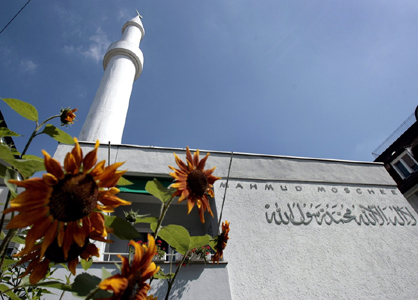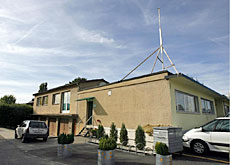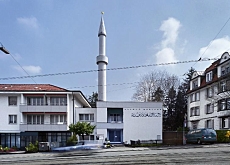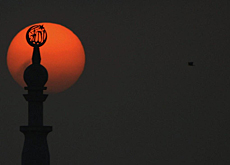Zurich minaret weathering political storm

A Zurich mosque complete with minaret continues to enjoy a peaceful coexistence with the local community amid an escalating row that is dividing Switzerland.
The mosque’s imam cannot understand why the cantonal branch of the rightwing People’s Party has called for a future ban on “provocative” minarets that symbolise an “expansionist, aggressive religion”.
The initiative launched last week, which is backed by two other political parties in the Canton Zurich parliament, has sparked fierce debate about religious freedom in Switzerland.
In the midst of the storm sits the unassuming, two-storey building sporting a spindly tower that is dwarfed by a Reformed Church building across the road. The minaret is one of only two in Switzerland – the other being in Geneva.
It is business as usual at the Mahmud mosque, built in the Balgrist district of Zurich in 1963, with as many as 200 worshippers attending each Friday afternoon.
“The argument that minarets are a symbol of Islamic aggression is not just 100 per cent wrong, it is 200 per cent wrong,” Imam Sadaqat Ahmed told swissinfo.
“The purpose of the minaret is not to dominate but to act as a visible landmark to inform people that this is a place of worship. It does not outwardly call people to worship, like bells in a Christian church, but its focus is pointed inwards towards the mosque.”
Opposition
The People’s Party initiative represents a growing opposition in some quarters to minarets in Switzerland. Earlier this year, the local authorities in Wangen, near Olten, and Langenthal in canton Bern blocked plans for similar constructions.
Ahmed says the Mahmud mosque minaret had gone largely unnoticed until the events of the past few days.
“In my five years here we have never had any complaints about the minaret and the mosque has an excellent relationship with the local community,” he said.
“In fact, many people of all religions come in off the street because they are curious and want to find out more about what we do here.”
Sylvia Stadler Langhart, president of the Balgrist church board, told swissinfo that church worshippers had accepted the minaret.
“We have no problem with the minaret or the mosque. Obviously we worship on different days so we do not have much contact, but we have never had any problems or complaints against the mosque,” she said.
Religious (in)tolerance
Khalid Bhatti used to worship at the Mahmud mosque when he was studying electrical engineering at ETH four years ago before moving to Germany. He returned to visit the mosque on a brief trip to Switzerland.
“Switzerland has an image in the outside world of being broad minded and tolerant of other religions. In my three years in Germany I have not heard of any problems with building minarets,” he said.
“It is very strange coming back to Switzerland to hear these arguments.”
But Ahmed believes many people in Switzerland will reject the People’s Party proposals.
“I am embarrassed at the message the party is giving to the outside world. They call themselves the People’s Party, but their views do not represent the Swiss people that I have met who are not so narrow minded,” he said.
swissinfo, Matthew Allen in Zurich
Muslims have submitted plans to build minarets at a number of locations, including Wangen near Olten in canton Solothurn, at Langenthal in canton Bern, at Wil in canton St Gallen, Wohlen in canton Aargau and near Biel in canton Bern.
A recent report from the Swiss Federal Commission Against Racism called for more tolerance towards Muslims and highlighted the minaret controversy in Wangen.
A minaret is a tower, traditionally part of a mosque, with a balcony from which a muezzin calls Muslims to prayer. In modern mosques, the minaret is equipped with loudspeakers.
In Switzerland, only the mosques in Geneva and Zurich have a minaret. The call to prayer is not made from these minarets.
There are about 340,000 Muslims in Switzerland, coming mainly from the Balkans and Turkey.
Their numbers are growing in Switzerland. They represented 2.2% of the population in 1990 and 4.3% in 2000.
One of the main reasons for the rise is the arrival of refugees from the former Yugoslavia.

In compliance with the JTI standards
More: SWI swissinfo.ch certified by the Journalism Trust Initiative




You can find an overview of ongoing debates with our journalists here. Please join us!
If you want to start a conversation about a topic raised in this article or want to report factual errors, email us at english@swissinfo.ch.